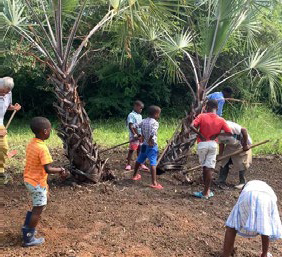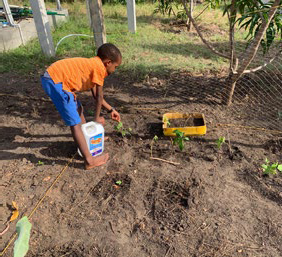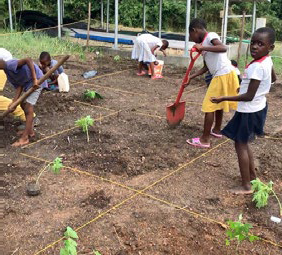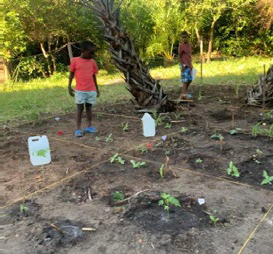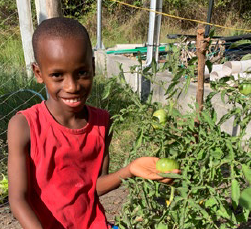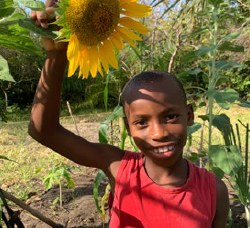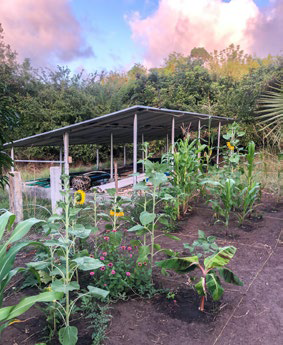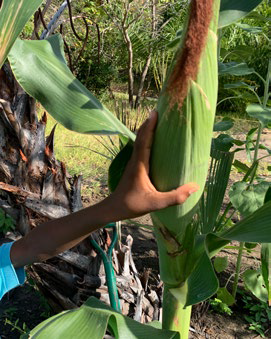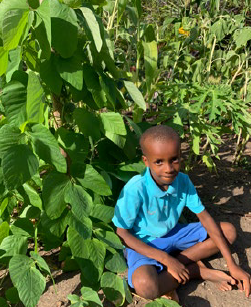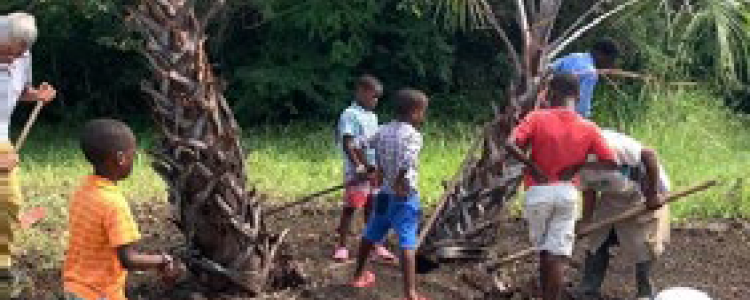
Dear Loved Ones,
We would especially like to dedicate this newsletter to our children. They continue to bring us much joy, although they are sometimes associated with some concerns, echoing the saying: “Small children, small problems; big children, big problems.” Raising so many children responsibly is certainly not easy. However, the joy to see their positive development outweighs the challenges we face by far. We will not talk about any problems today.
Our Children
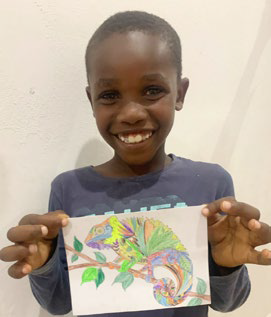
Currently, we are responsible for 31 children from one to eleven years of age. Since our last newsletter, one child has been adopted. Our children’s home will be able to accommodate 50 to 60 children up to 18 years of age. In total, 11 of our children attend our English-speaking primary school. The school children can already hold a decent conversation in English, which is not common in Tanzania. Even our youngest preschoolers understand some English.
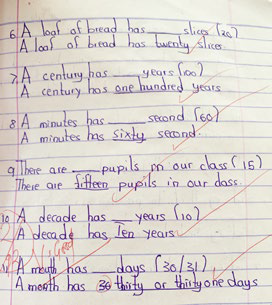
Pocket Money
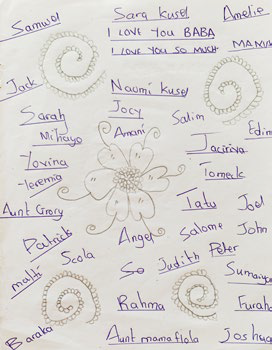
Since August, we started giving our older children a small monthly allowance of 1.50 USD. With this modest sum, they can buy small items like an extra dress, shoes, pencils, shovels for their gardening tasks (which we will discuss later), a new ruler for school, or other little things. The allowance teaches them to handle money responsibly and to appreciate and take care of their possessions.
In many churches it is customary to give God a tenth of one‘s income. God placed a special blessing on giving tithe. He promises that by doing so, one would not suffer loss: „’Bring the whole tithe into the storehouse, that there may be food in my house. Test me in this,’ says the Lord Almighty, ‘and see if I will not throw open the floodgates of heaven and pour out so much blessing that there will not be room enough to store it.’“ (Malachi 3:10). To instill in our children the value of not just thinking of themselves, we started teaching them the principle of tithing.
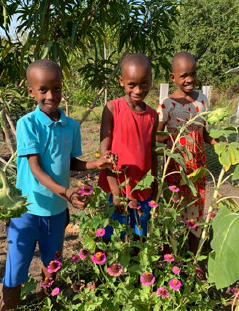
One of our children came and asked if he should cut his banknote (worth 2,000 TSH, less than 1 USD) to give a small portion as a tithe. We gladly exchanged the note for coins.
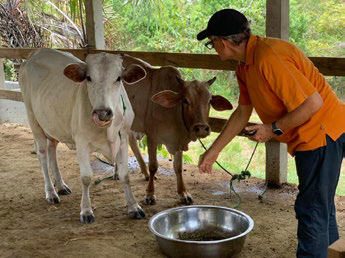
Another child wanted to support a church project and asked us if we could buy a small wild mango plant he had found. We agreed, after which he promptly went to the pastor and handed him his money.
One of the children asked if they could also share some of their pocket money with the younger children – which we happily agreed to.
One of our children wanted to buy our binoculars. Since we had no intention of selling them, I quoted a price high enough that it would be impossible for him to purchase the item. I asked for one hundred thousand Tanzanian shillings (100,000 TSH, approximately 40 USD). Amalo* immediately said that he will give me the money. I was quite surprised until he explained, that he had one thousand and one hundred shillings (1,100 TSH = 50 US Cents).
Vegetarian diet
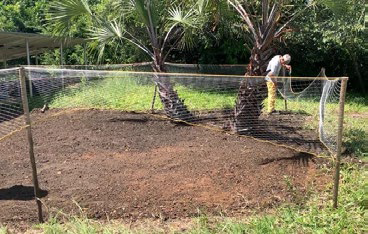
For health reasons, our children eat a vegetarian diet. When they learned that some people believe that one should eat meat, they
asked, “How can one eat animals? That‘s terrible; we love animals so much.” This led to some creative ideas:
- We‘ll just drop the meat on the ground so no one can eat it.
- We‘ll go to the toilet and spit it out.
- We‘ll wear pants with the biggest pockets, hide the meat there, and later give it to the cats.
- We‘ll sprinkle so much salt on it that it becomes inedible.
- Also, we must definitely pray that the other children in our school don‘t eat meat.
Gardening
Our school children often help in the garden. They loved their little tasks and asked us for their own piece of land. So, one Sunday, together with the children we started preparing a garden patch right in front of their home. We erected a fence to keep hungry geese or chickens from destroying the crop and allocated each child about four square meters of garden.
They then received seeds and plants; like sunflowers, tomatoes, beans, banana plants, fast-growing papaya trees, corn, etc... . Now they had to learn to care for their gardens, watering their plants regularly mornings and evenings.
After a few weeks with diligent watering, we can already see beautiful sunflowers and ripening tomatoes.
The children can decide whether to give their produce to the kitchen or to enjoy it themselves. Two particularly business-minded children asked us for a larger garden patch in order to plant more papaya trees. They plan to supplement their pocket money by selling papayas to the kitchen. Another child decided to give the produce to needy families in the village.
Music and sewing lessons
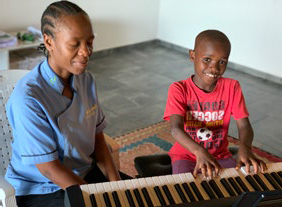
We recently acquired a Yamaha keyboard. One of our caretakers is piano teacher, allowing us to offer regular piano lessons to some children. It‘s challenging, but they‘re making progress.
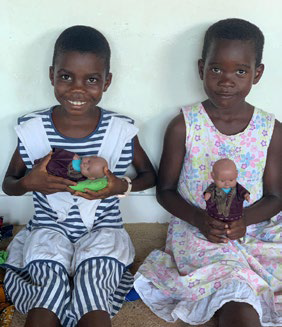
Two of our boys wanted to own their own flutes. They still need a lot of practice, but it‘s a good start.
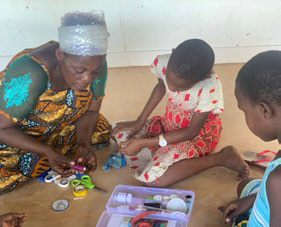
Our older girls started taking sewing lessons. A local seamstress agreed to teach them. They‘ve already made a few dresses and skirts for their dolls. They genuinely enjoy sewing and we will soon teach them how to use a mechanical sewing machine.
Visiting the sick
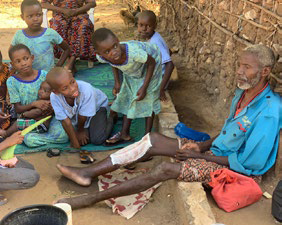
Every Saturday afternoon, we visit needy families in the vicinity. Last Saturday, we visited the neighbor of one of our caregivers. A few weeks ago, he passed out and inadvertently his right leg fell into the open flames of his stove. A few days before our visit, he was discharged from the hospital because the doctors couldn‘t do anything else for him. His leg was infected and looked horrifying. Our children were deeply moved by the sight. We treated the leg with antibacterial cream and applied a sterile bandage. Our children pray for the man and often accompany us to check on the patient‘s condition. Even within a short time, we already notice improvement.
By visiting needy families, the children learn to practice true Christian charity. They should know that they are better off than many families in our village.
Why did Jesus die
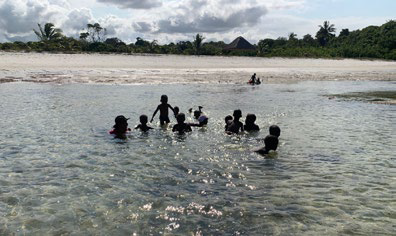
Our children learn Christian principles of love for their neighbors and care for others. This includes regular morning and evening devotions. They particularly enjoy singing songs and have memorized over 30 songs, with more than two stanzas. We review the most important lessons of our devotions by asking them some questions. To the question of ”why Christ died for us“, a prompt answer came: „So that husbands can communicate with their wives again.“ I am sure there was a slight misunderstanding.
Day and night
To improve their German language skills, we show the children selected, easily understandable YouTube videos about nature and science. We recently watched an episode about our solar system. They were supposed to learn that day and night occur because the Earth rotates on its own axis. When I asked them why there is day and night, the enlightening answer came: „So that we can sleep at night and work during the day.“
Construction Updates
The underground cellar on our farm is almost completed.
The demolition of the walls, solar panels, and the remaining roof of our school and church building, which was destroyed by a fire in February of this year, has been completed. We will soon start rebuilding the walls.
The foundation of the new cafeteria, along with sewage pipes and the corresponding sceptic tanks, has been laid. Next, the floor slab will be poured, and then the main structure will be constructed. The most challenging part will be the roof construction.
We are currently receiving active support from German experts for the installation of a fire-fighting system.
Others
In November, the manager of the orphanage, Jackline John, will be in Europe in order to receive a new leg prosthesis – we had mentioned this in our previous newsletter. Thankfully, our German Embassador helped us to secure a visa.
We want to express our gratitude for your ongoing support. A specially heartfelt thanks to those who donated for the reconstruction of the school-building.
Without you, it wouldn‘t be possible to provide our children with a hopeful future.
With warm regards and blessings.
With warm regards and blessings.
yours
* The names have been changed.
Wired Donations to:
Tanzania
DUNIA YA HERI African Family and Healthcare, P.O. Box 71573, Dar es Salaam, Tanzania
NIC Bank Tanzania Limited, Kariakoo Branch, Dar es Salaam
Account Number USD: 2000234853
Swift Code: SFICTZTZ
Intermediary Bank: CITIBANK NEW YORK, Swift Code: CITIUS33
Within the US
Donations from US-citizens are tax deductible if they are given to one of the following None Profit - 501c3 Organizations:
- our partners “RESTORE A CHILD”: http://restoreachild.org/donate/
- OUTPOST CENTERS INTERNATIONAL: http://www.outpostcenters.org/donate/
Please do not forget to mention the project name of »DUNIA YA HERI« on your check, transfer slip or the “ministry need”.

